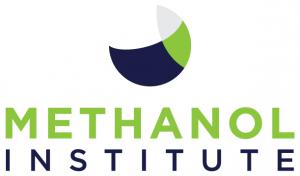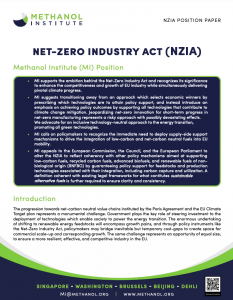Methanol Institute reaction to the ITRE Committee vote of the European Parliament on the Net Zero Industry Act (NZIA),
The NZIA has been designed to consider all climate protection technologies, avoiding any artificial division into separate categories. This inclusive approach is expected to quicken project initiation timelines, streamline financial assistance, and invigorate the entire spectrum of climate protection technologies, production and deployment system.
The initial proposition by the Commission had classified climate protection technologies into 'strategic' and 'non-strategic' groups. Those tagged as 'strategic net-zero technologies' would have benefitted from faster approval times and enhanced financial resource access. Now, it is suggested that member states have the discretion to assign strategic status to projects based on a set of varied criteria, including Carbon Capture and Utilization (CCU) that MI has advocated for and which aligns well with the imminent domestic implementation of the Renewable Energy Directive (RED), fostering a faster scale-up of climate protection technologies.
Notwithstanding, the narrow definition of "Sustainable Alternative Fuels" provided by sector-specific regulations, such as ReFuelEU Aviation and FuelEU Maritime, has been flagged as an area of concern. The versatility of biofuels, including bioMethanol, is not limited to a single sector; these fuels are essential across various applications, from maritime to aviation and even road. A diverse market for these fuels is crucial for stabilizing investments.
In response, various European federations have advocated for a sector-agnostic definition of Sustainable Alternative Fuels within the RED, to ensure the NZIA is implemented effectively and without legal ambiguities.
The European Parliament is expected to vote during the plenary session on these matters in the week of November 20, with the categorization of strategic technologies still a central topic of discussion within the Council of the EU.
The full position paper of Methanol Institute is available on our website HERE.
About the Methanol Institute
The Methanol Institute (MI) serves as the trade association for the global methanol industry, representing the world’s leading producers, distributors, shippers, and technology companies. MI now represents its members from five offices around the world in Singapore, Washington DC, Beijing, Brussels, and Delhi.
Rafik Ammar
Methanol Institute
+33 7 82 81 15 18
email us here
Legal Disclaimer:
EIN Presswire provides this news content "as is" without warranty of any kind. We do not accept any responsibility or liability for the accuracy, content, images, videos, licenses, completeness, legality, or reliability of the information contained in this article. If you have any complaints or copyright issues related to this article, kindly contact the author above.


